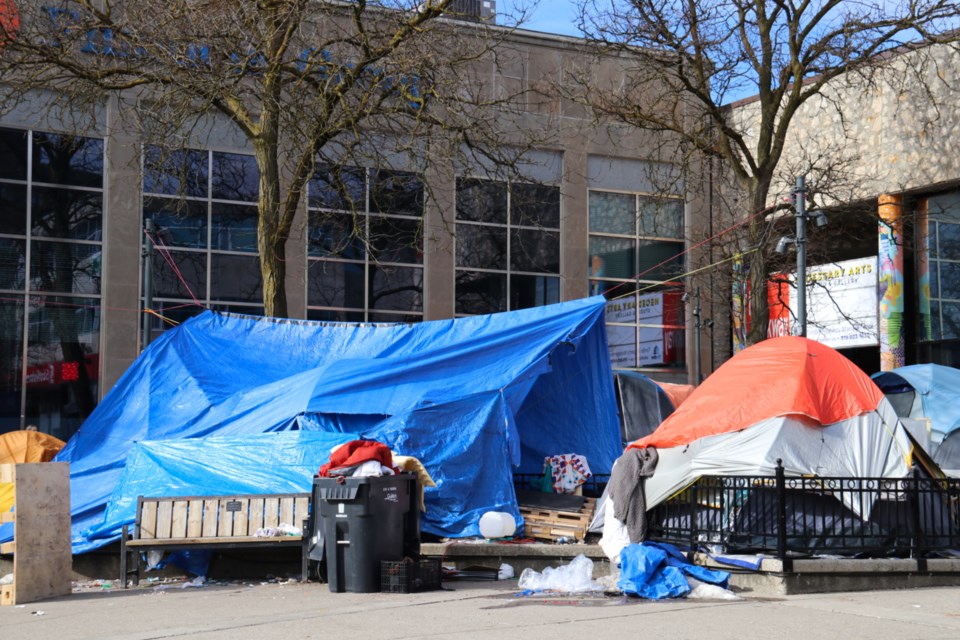Health and homelessness are inextricably intertwined. That was the main theme of the housing symposium held at the Delta Hotels Guelph Conference Centre on Wednesday.
Hosted by county officials, the event brought together nearly 200 people, including elected officials, people from the business sector, and those with lived experience, to discuss root causes and solutions to homelessness.
Among them was the importance of integrating healthcare with housing services and other sectors to get people housed and stable, by using a housing-first, harm reduction and reconciliation lens and pivoting to a preventative approach rather than a reactive one.
Mark Poste, director of housing with the County of Wellington, said without wraparound health, mental health and addictions support, many housing placements wouldn’t be successful, and that if someone is staying in a shelter, they’ve already been failed elsewhere by systems meant to support them.
In other words, they’re not coming to emergency shelter systems “unless they’ve fallen through the cracks,” he said.
This was echoed by other panelists and speakers, who emphasized the need for preventive mental health and addictions care – especially for children and youth.
“If you don’t graduate high school, you’re very likely to end up on our by name list,” Medical Officer of Health Dr. Nicola Mercer said.
That means it’s important to ensure children have their needs met and are set up for success before they even start school.
Mercer also said stigma needs to be addressed when tackling homelessness: she said, for instance, we could provide lockers in rec centres for unhoused people to use, but we don’t typically want homeless people to come into the rec centres.
“Why not?” she asked. They could shower, store their belongings, and get out of the cycle of homelessness.
“Poverty is not a disease. We need to stop thinking of it like that,” she said. “It’s a series of unfortunate events that often begin long before the person was of age to make a decision.”
Changes like these are what Poste called “low hanging fruit” that can more easily be addressed.
Attendees also heard from Erin Dej, an associate professor and critical criminologist with Wilfrid Laurier University.
Dej said there are different types of homelessness, and all need to be addressed. This includes unsheltered people and those provisionally accommodated, meaning someone who has a roof over their head but it isn’t stable or permanent, and people at risk of homelessness, in permanent but not suitable or safe homes.
It also includes Indigenous homelessness, which is not just about having a structure to live in, but being separated from community, land, culture and language.
When people think of homelessness, she said the focus tends to be on individual and relational causes – like job loss or divorce – but systems issues (like services gaps that put people at risk of homelessness) and structural issues (like policies and investments that impact people) are also contributing factors.
“The problem is, if we focus only on those individual factors, we’re missing a huge two thirds of these root causes of homelessness,” Dej said. “The level of crisis we’re seeing in 2024 is bigger than any individual making one or two bad decisions.”
This is shown in the numbers: Homelessness increased across Canada by 20 per cent from 2018 to 2022, and visible homelessness increased by 88 per cent, she said.
In Guelph, there are around 3,100 households on the waiting list for social and affordable housing, up from under 2,000 in 2019 – but the county only has 3,600 units.
Meanwhile, more than 200 households in Guelph are experiencing chronic homelessness in Guelph and Wellington County, and six per cent of residents in Wellington County and eight per cent of residents in Guelph are considered low-income.
“That’s thousands of people in our area at risk of homelessness,” Mercer said, just one renoviction or mental health crisis away from being without a home.
All three causes and all types of homelessness need to be addressed if we’re going to “meaningfully prevent homelessness,” Dej said.
But she said prevention shouldn’t be left only to the homeless sector, echoing Poste’s statement that if they are unhoused, they’ve already fallen through the cracks.
One example of how to connect these systems can be found in Windsor.
Kelly Goz, manager of homelessness and special projects for the City of Windsor, also spoke to what her city is doing right.
Over the pandemic, Windsor repurposed an underutilized city facility, turning into a homeless and housing help hub, that now runs from 8 a.m. to 11:30 p.m. daily, including holidays.
More than 2,000 unique participants have accessed the program over 100,000 times. Staff are encouraged to spend time and interact with people coming in to build relationships and trust.
She said in doing so they have connected a number of different sectors with people – from healthcare professionals to parole officers and Indigenous justice coordinators.
In the fall, she said at least 133 people were not reincarcerated because parole or probation officers were able to connect with people at the hub. The initiative spurred a collaboration between police and the hospital to provide harm reduction care, fentanyl test strips and episodic medical care. Of the patients seen in this way, 44 per cent were diverted from the ER.
“Engage in dialogue, check for understanding and clarify (untruths). Understand the data and what your role may be,” Goz said. “Housing is healthcare and healthcare enables people to remain housed.”
